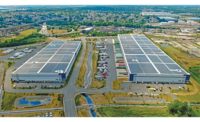Coronavirus and Construction
Most Brazil Projects Progress Despite the Pandemic

Workers take precautions against COVID-19 at a jobsite in Brazil.
Photo courtesy Toctao Engineering
With nearly 700,000 confirmed cases of COVID-19, Brazil trails only the U.S. as the most-impacted country, but in pushing to maintain economic activity, leaders have allowed construction to continue.
Projects have not shut down in most of Brazil's 27 states, including Rio de Janeiro, São Paulo and Minas Gerais—its three largest economies.
An estimated 88% of housing, infrastructure and industrial building projects remain in progress, according to Brazil’s Building Construction Syndicate. Measures of physical distance and hygiene have been adapted at jobsites.
Before the pandemic, one Brazilian construction Industry survey predicted a 3% increase in total construction market volume in 2020, primarily based on a strong housing sector.
But a recent forecast by Tendências, a Brazilian consulting firm, says it has triggered what is expected to be a 3.9% market drop compared to 2019.
According to the Ministry of Labor, 66,000 construction workers lost their jobs in April. The quarantine period due to the pandemic started in the country in mid-March.
The agribusiness and mining sectors are the least affected by the country's recent economic crisis and projects are ongoing using several measures to protect workers to prevent coronavirus transmission.
Yara International ASA, one of the world's largest fertilizer producers, is expanding its plant in Rio Grande, in Rio Grande do Sul stat in the country's southern region but work to complete the $350-million project now is delayed to the fourth quarter. Although Brazil's agribusiness sector initially remained on alert when China had its quarantine period earlier this year, there was a rapid recovery of exports to that country.
Yara is also developing the Serra do Salitre mining-industrial complex in Minas Gerais state, which has been delayed by six months due to the pandemic, now due to be complete in 2021. The project is in its second stage and involves construction of a chemical plant. A phosphate mine and cmeical processing area already is in operation.
Mining giant Vale is maintaining its dam deactivation work, after the January 2019 failure of a tailings dam in Brumadinho, Minas Gerais State, which killed more than 250 people. Nine tailings dams are being decommissioned. Part of the project involves construction of three large containment structures, which involves work by 18 engineering and construction companies, with 875 pieces of equipment in operation. Work is expected to last until 2027 and cost $1.9 billion.
One of the largest infrastructure projects under way in Brazil is the West-East Integration Railway, a 1,527-km line to connect the country’s center—its last agricultural frontier—to the port of Ilhéus, in the State of Bahia. The line will also pass through an important iron ore complex in the state.
Valec, a public company controlled by the Ministry of Infrastructure, is building the project. To speed execution, the government assigned one segment of the railway's second section to the Brazilian army’s engineering division.
The project is divided into three sections. The first 537-km segment, from iron ore mines in Caetité city in Bahia State to Ilhéus, is almost completed. The 485-km-long second section from Barreiras, the country's new agricultural hub in the far west of Bahia State, to Caetité, is set to finish in 2022. Construction on the final 505-km segment has not yet started.
With completion of first-section construction, the government will start a bidding process to operate it as a private concession, with some Chinese companies demonstrating interest in operating the line to export products, especially iron ore and grains.
China's prominent business role in Brazil has focused on integrated logistics. China Communications Construction Co, a government-owned company, is building a port In São Luís city, Maranhão State, to serve export of agricultural commodities to China. It will feature a 656-meter quay with three berths, a 1,085-m access bridge and 370 acres devoted to warehousing and cargo-moving operations.




